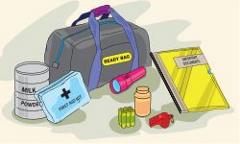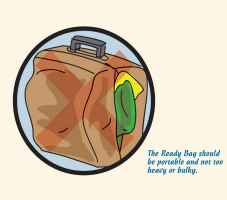Emergency Ready Bag
The Ready Bag contains important items that will help you in an emergency and you should bring it along with you when you are required to evacuate your home. Every member of your family should know where the Ready Bag is kept and it is recommended that the storage location is easily accessible even in the dark (e.g. during power outages).

The Ready Bag should contain the following items:
| ESSENTIAL ITEMS | USAGE |
|---|---|
| Torchlight without batteries | In case of power outage and when evacuating in the dark. |
| Batteries | For powering the torchlight; pack extra batteries and do not fit batteries into the devices until needed, as leaving them there may result in leakage or rust. |
| Essential personal medication | For any existing medical condition of yours and your family, e.g. asthma, heart problems etc. |
| Waterproof folder containing photocopies of important documents e.g. NRIC, insurance policies | For administrative purposes should the original documents be destroyed in the fire/emergency. |
| Whistle | To call for help or alert others; shouting may be tiring, ineffective and may even cause you to inhale dangerous amounts of smoke and dust in some cases |
| First aid kit | To treat any minor injuries. |
| Childcare supplies and other special care items | To meet the needs of any special individuals groups in the family, e.g. infants. |
| N95 Mask | To protect you and your family from excessive exposure to pollutants and air-borne infections. |
Optional Items for the Ready Bag include:
- A list of personal contact numbers, including telephone numbers of family members.
- Cash.
- Bottled water and dry foodstuff.
- A set of spare clothing, e.g. T-shirt and track pants.
- A list of emergency numbers, e.g. 995, 999, telephone numbers of the utility companies, insurance companies etc.
Points to Note of the Ready Bag
- You may have more than one Ready Bag, e.g. one for each family member.
- Do not pack bulky items into the Ready Bag as it may hamper movement during an emergency.
- Check expiry dates of perishable items in the bag and replace them when needed.
- Periodically replace batteries with new ones and do not place them inside devices e.g. torchlight.

